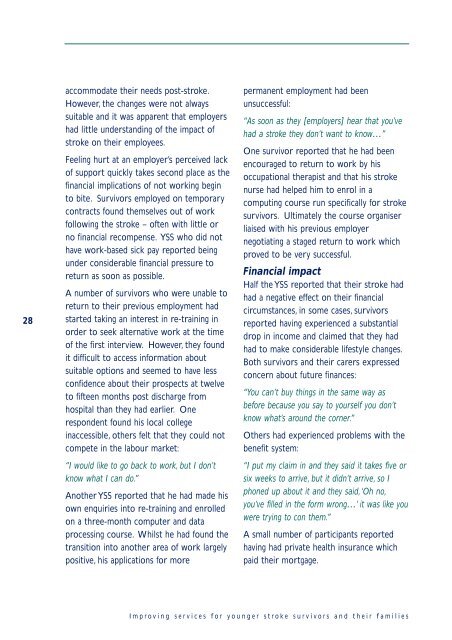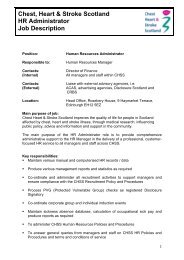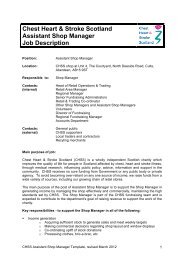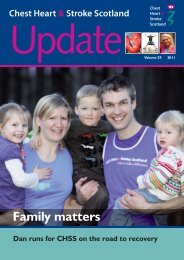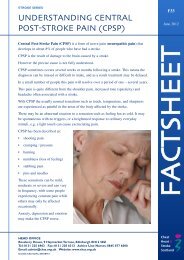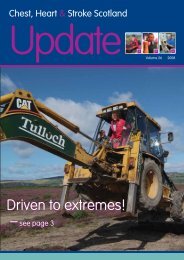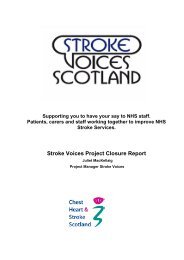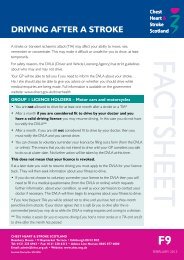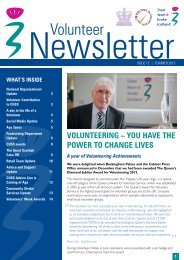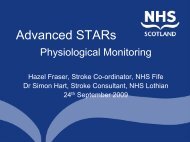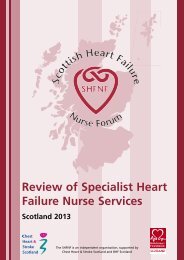Improving services for younger stroke survivors and their families
Improving services for younger stroke survivors and their families
Improving services for younger stroke survivors and their families
- No tags were found...
Create successful ePaper yourself
Turn your PDF publications into a flip-book with our unique Google optimized e-Paper software.
28accommodate <strong>their</strong> needs post-<strong>stroke</strong>.However, the changes were not alwayssuitable <strong>and</strong> it was apparent that employershad little underst<strong>and</strong>ing of the impact of<strong>stroke</strong> on <strong>their</strong> employees.Feeling hurt at an employer’s perceived lackof support quickly takes second place as thefinancial implications of not working beginto bite. Survivors employed on temporarycontracts found themselves out of workfollowing the <strong>stroke</strong> – often with little orno financial recompense. YSS who did nothave work-based sick pay reported beingunder considerable financial pressure toreturn as soon as possible.A number of <strong>survivors</strong> who were unable toreturn to <strong>their</strong> previous employment hadstarted taking an interest in re-training inorder to seek alternative work at the timeof the first interview. However, they foundit difficult to access in<strong>for</strong>mation aboutsuitable options <strong>and</strong> seemed to have lessconfidence about <strong>their</strong> prospects at twelveto fifteen months post discharge fromhospital than they had earlier. Onerespondent found his local collegeinaccessible, others felt that they could notcompete in the labour market:“I would like to go back to work, but I don’tknow what I can do.”Another YSS reported that he had made hisown enquiries into re-training <strong>and</strong> enrolledon a three-month computer <strong>and</strong> dataprocessing course. Whilst he had found thetransition into another area of work largelypositive, his applications <strong>for</strong> morepermanent employment had beenunsuccessful:“As soon as they [employers] hear that you’vehad a <strong>stroke</strong> they don’t want to know…”One survivor reported that he had beenencouraged to return to work by hisoccupational therapist <strong>and</strong> that his <strong>stroke</strong>nurse had helped him to enrol in acomputing course run specifically <strong>for</strong> <strong>stroke</strong><strong>survivors</strong>. Ultimately the course organiserliaised with his previous employernegotiating a staged return to work whichproved to be very successful.Financial impactHalf the YSS reported that <strong>their</strong> <strong>stroke</strong> hadhad a negative effect on <strong>their</strong> financialcircumstances, in some cases, <strong>survivors</strong>reported having experienced a substantialdrop in income <strong>and</strong> claimed that they hadhad to make considerable lifestyle changes.Both <strong>survivors</strong> <strong>and</strong> <strong>their</strong> carers expressedconcern about future finances:“You can’t buy things in the same way asbe<strong>for</strong>e because you say to yourself you don’tknow what’s around the corner.”Others had experienced problems with thebenefit system:“I put my claim in <strong>and</strong> they said it takes five orsix weeks to arrive, but it didn’t arrive, so Iphoned up about it <strong>and</strong> they said,‘Oh no,you’ve filled in the <strong>for</strong>m wrong…’ it was like youwere trying to con them.”A small number of participants reportedhaving had private health insurance whichpaid <strong>their</strong> mortgage.<strong>Improving</strong> <strong>services</strong> <strong>for</strong> <strong>younger</strong> <strong>stroke</strong> <strong>survivors</strong> <strong>and</strong> <strong>their</strong> <strong>families</strong>


